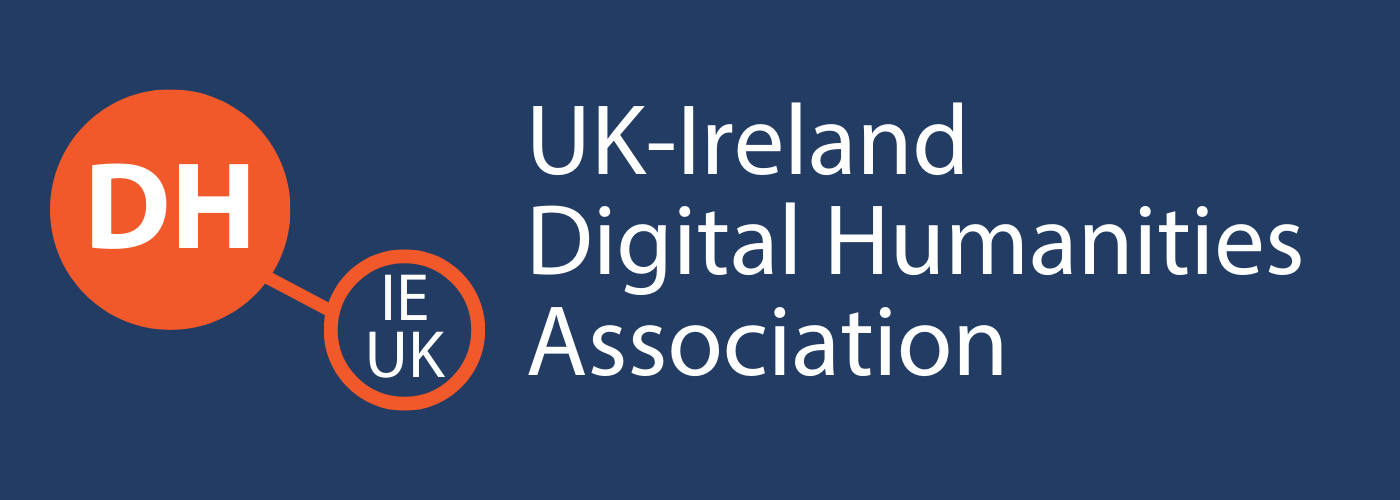Members' Briefing
2022-2023It has been a busy first year of the UK-Ireland Digital Humanities Association, from the release of the roadmap document last June to our formal launch event just a few weeks ago. We are grateful to the many of you who have come together to shape the Association – whether by responding to survey and interview requests, contributing to workshops, commenting on reports, attending events, or otherwise sharing your thoughts and ideas. We look forward to actively engaging with you as we continue the process of building – and building on – community through consultation, and of defining value and purpose through collaboration.
After reflecting on some of the milestones from the past year (and there’s a lot to celebrate – so please read on!), we would love to hear from you about your hopes for the Association’s coming year and your feedback on the work done so far. Is there something missing from the three-year roadmap? Where would you like to see more advocacy work being done? Should we be using different benchmarks for equity, inclusion and diversity within the Association? Please let us know what you think.
We are also looking for people to help us put those thoughts into action. If you are interested in joining the Collective, the group of people facilitating the Association’s development, please keep an eye out for a call for interest this autumn. If you have any questions about getting involved in the meantime, please get in touch at uk-ie.digitalhumanities@sas.ac.uk.
New members
Since we launched our newsletter and membership interest form in September, we have had over 200 people sign up. Based on institutional affiliations, around 20% of those are based in Ireland and around 70% are based in the UK. We’ve also had international colleagues from the United States, Europe, India, South Africa, and Egypt express interest. Most of the sign ups have been from universities, but we also have members from learned societies, archives, museums, libraries, and the publishing sector. In our next year we hope to expand this group to include more people doing digital arts and humanities research in both countries, with a specific focus on the creative sector, Irish institutions, and GLAM organisations.
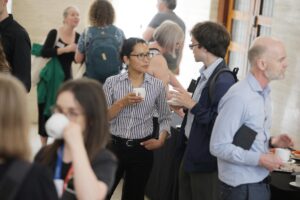
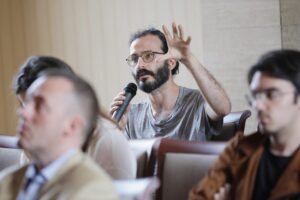
Roadmap
In June 2022 we published the Association Roadmap, which will guide the transition from the original network grant to a self-sustaining organisation. The roadmap grew out of two years of consultation with the digital humanities community in Ireland and the UK. It sets out our goals for the next three years – we encourage you to take a look and let us know what you think.
Working Papers
We also released several working documents for community consultation. These documents lay out how the Association plans to approach major questions like governance, membership, and programming. This year, we’ve focused on advocacy; inclusion, equity and diversity; and stakeholder identification. We also published a terms of reference document, which will guide the governance of the Association during the transition period. They are all open and living documents and we welcome feedback on how we can improve them to better meet the needs of the DH community.
Community Interest Groups
In April, we launched the first cohort of community interest groups, with five groups covering a range of research areas, communities of practice, and issues within the field. These groups serve as one of the primary vehicles for community building within the Association and help the Association become more inclusive, collaborative, and sustainable by providing spaces that respond to community needs. All the groups are actively welcoming new members to participate in and co-create their activities over the next 18 months. You can get involved by emailing the contact listed on the Community Interest Groups webpage.
The current groups are:
- Research Software Engineering in the Arts and Humanities
- Digital Humanities Climate Coalition
- Digital Correspondence: transhistorical perspectives on language, materials and corpora
- Multilingual DH in the UK and Ireland
- Protecting the Investigator in Traumatic Research Areas
Association Launch Event
In June, we marked the formal launch of the Association with a two-day event in London. The event saw over 120 people from Ireland, the UK, and international partners come together to share research, participate in community interest group activities, and build new connections. We also introduced the Association and received valuable input about where to go next. This feedback, alongside comments from presentations at DH2023 in Graz and at the Digital Humanities @ Oxford Summer School, will help shape the Association’s next steps.
We’ve collected the feedback and reflections from the event, which are available on our website.
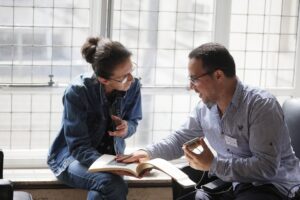
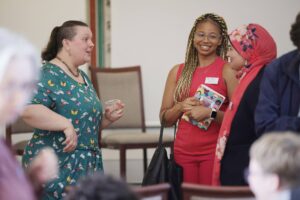
Research Excellence Framework 2028
The next Research Excellence Framework (REF) exercise will be held in 2028, with eligible institutions submitting their returns in late 2027. It will look different from REF 2021 in some key areas. The three main elements of the last REF – environment, outputs and impact – have been renamed and refocused and the respective weightings adjusted accordingly. A number of other changes have been agreed, some aspects of which require further consultation with research communities.
We are very aware that the REF only directly affects researchers in the UK, but the Association acknowledges the impact that national policies and developments in both Ireland and the UK have on our regional DH landscape.
A short, targeted consultation was opened on 15 June 2023 and will close on 6 October 2023. Like many other learned societies and subject associations, the UK-Ireland Digital Humanities Association will be submitting a response to the consultation, and we are keen to represent your views. If you would like to provide any feedback, which will be included in the Association’s response, please visit our website to learn more.
DARIAH Cooperating Partner Information
In July 2023, King’s College London (KCL) and the School of Advanced Study, University of London (SAS) joined the University of Exeter as DARIAH Cooperating Partners in the UK. This strengthens connections between the Association and DARIAH as all three institutions are members of the organising collective, complementing Ireland’s full membership status. The close connections with DARIAH and the European Digital Humanities community were very much in evidence at the Association launch event in June. The keynote was delivered by the Director of DARIAH, Agiatis Benardou, who highlighted the importance of international collaboration in inspiring, developing and sustaining ground-breaking research and education. There was also an opportunity for event attendees to discuss Cooperating Partner status for their own institutions with the Officer for National Coordination, Edward Gray. We hope that there will soon be more than three Cooperating Partners in the UK, working together to promote the value of collaborative digital scholarship.
In 2023-4, Exeter, KCL and SAS are looking forward to participating in various working groups, learning from the wealth of knowledge and experience that resides in DARIAH. We will also be working together to organise a DARIAH Day in 2024-5, designed to showcase collaborative research and teaching initiatives and to promote the work of DARIAH to UK stakeholders and potential partners. Watch this space for more information!
Looking Forward
In the coming year, the Association will continue to develop the structures necessary to support the organisation while working to expand its reach. We hope to release additional working papers focused on career trajectories within digital humanities and supporting cross-sector collaboration, while refining the existing documents based on community feedback. We also hope to begin work on several of the projects outlined in our working papers from this past year. This could include a stakeholder mapping exercise to inform future advocacy work or the development of partnerships with organisations in the creative industries.
We also plan to bring new members into the Collective and start the process of articulating a formal membership structure for the Association. We particularly welcome thoughts on inclusive ways of understanding membership and what specific benefits the Association might provide to its members.
Thank you for your active support and engagement, which has made this first year such a success. We look forward to continued collaboration in the year to come.
